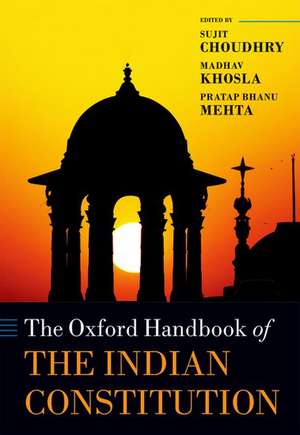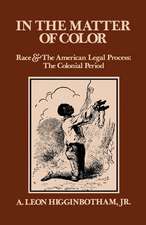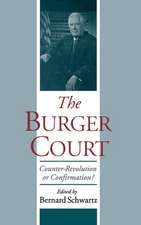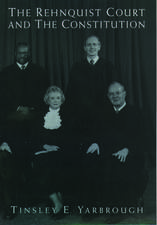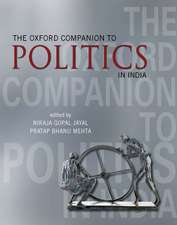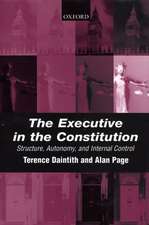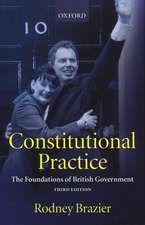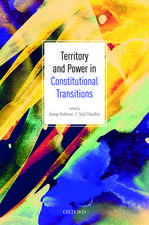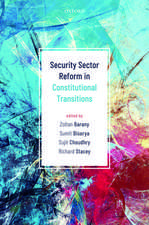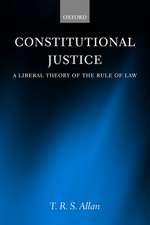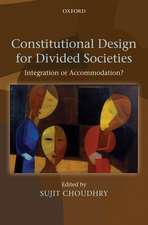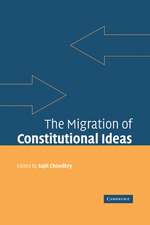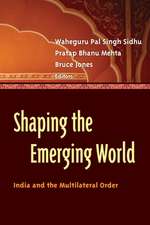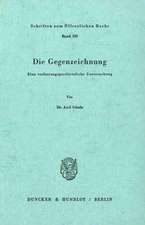The Oxford Handbook of the Indian Constitution: Oxford Handbooks
Editat de Sujit Choudhry, Madhav Khosla, Pratap Bhanu Mehtaen Limba Engleză Hardback – 24 mar 2016
Din seria Oxford Handbooks
-
 Preț: 236.89 lei
Preț: 236.89 lei - 15%
 Preț: 358.80 lei
Preț: 358.80 lei - 17%
 Preț: 912.51 lei
Preț: 912.51 lei - 12%
 Preț: 308.25 lei
Preț: 308.25 lei - 25%
 Preț: 829.05 lei
Preț: 829.05 lei - 14%
 Preț: 987.01 lei
Preț: 987.01 lei - 26%
 Preț: 1376.97 lei
Preț: 1376.97 lei - 29%
 Preț: 929.22 lei
Preț: 929.22 lei -
 Preț: 303.54 lei
Preț: 303.54 lei - 26%
 Preț: 343.85 lei
Preț: 343.85 lei - 14%
 Preț: 278.15 lei
Preț: 278.15 lei - 29%
 Preț: 930.94 lei
Preț: 930.94 lei - 30%
 Preț: 1065.79 lei
Preț: 1065.79 lei - 15%
 Preț: 357.85 lei
Preț: 357.85 lei -
 Preț: 263.45 lei
Preț: 263.45 lei - 23%
 Preț: 839.79 lei
Preț: 839.79 lei - 16%
 Preț: 264.39 lei
Preț: 264.39 lei - 33%
 Preț: 737.68 lei
Preț: 737.68 lei - 33%
 Preț: 725.45 lei
Preț: 725.45 lei - 26%
 Preț: 342.76 lei
Preț: 342.76 lei - 25%
 Preț: 366.95 lei
Preț: 366.95 lei - 13%
 Preț: 304.72 lei
Preț: 304.72 lei - 16%
 Preț: 263.35 lei
Preț: 263.35 lei - 12%
 Preț: 267.23 lei
Preț: 267.23 lei - 33%
 Preț: 815.51 lei
Preț: 815.51 lei - 6%
 Preț: 346.76 lei
Preț: 346.76 lei - 22%
 Preț: 1095.69 lei
Preț: 1095.69 lei - 29%
 Preț: 931.18 lei
Preț: 931.18 lei - 29%
 Preț: 942.77 lei
Preț: 942.77 lei - 24%
 Preț: 1071.82 lei
Preț: 1071.82 lei - 23%
 Preț: 1052.07 lei
Preț: 1052.07 lei - 21%
 Preț: 863.03 lei
Preț: 863.03 lei - 30%
 Preț: 815.25 lei
Preț: 815.25 lei - 29%
 Preț: 855.42 lei
Preț: 855.42 lei - 30%
 Preț: 842.04 lei
Preț: 842.04 lei - 11%
 Preț: 258.32 lei
Preț: 258.32 lei - 29%
 Preț: 859.35 lei
Preț: 859.35 lei - 29%
 Preț: 1083.61 lei
Preț: 1083.61 lei - 15%
 Preț: 273.41 lei
Preț: 273.41 lei - 30%
 Preț: 818.12 lei
Preț: 818.12 lei - 17%
 Preț: 365.23 lei
Preț: 365.23 lei - 21%
 Preț: 359.87 lei
Preț: 359.87 lei - 13%
 Preț: 264.87 lei
Preț: 264.87 lei - 9%
 Preț: 307.08 lei
Preț: 307.08 lei - 28%
 Preț: 845.79 lei
Preț: 845.79 lei - 23%
 Preț: 855.11 lei
Preț: 855.11 lei - 21%
 Preț: 861.04 lei
Preț: 861.04 lei - 12%
 Preț: 250.34 lei
Preț: 250.34 lei
Preț: 885.47 lei
Preț vechi: 1232.97 lei
-28% Nou
Puncte Express: 1328
Preț estimativ în valută:
169.44€ • 177.35$ • 141.02£
169.44€ • 177.35$ • 141.02£
Carte tipărită la comandă
Livrare economică 20-26 martie
Preluare comenzi: 021 569.72.76
Specificații
ISBN-13: 9780198704898
ISBN-10: 0198704895
Pagini: 1116
Dimensiuni: 171 x 246 x 57 mm
Greutate: 1.86 kg
Editura: OUP OXFORD
Colecția OUP Oxford
Seria Oxford Handbooks
Locul publicării:Oxford, United Kingdom
ISBN-10: 0198704895
Pagini: 1116
Dimensiuni: 171 x 246 x 57 mm
Greutate: 1.86 kg
Editura: OUP OXFORD
Colecția OUP Oxford
Seria Oxford Handbooks
Locul publicării:Oxford, United Kingdom
Recenzii
While there are already some existing substantial pieces of work on the Indian Constitution, the volume by Khosla et al. is exhilarating for two reasons. Firstly, the book is comprehensive for its encyclopedic coverage of the various dimensions related to the Indian Constitution - its genesis, its evolution, and its political and social relevance to the Indian society. Secondly, the book enterprisingly brings together a multifaceted set of perspectives emanating from both varied disciplinary standpoints and intellectual concerns. ... The book is useful to any scholar interested in issues surrounding the Indian Constitution, and will equally prove to be a good reference text for students of Indian constitution and legal history of India.
Issues have been addressed with a competence and an intellectual rigour that does justify the claim on the books blurb that it is "an essential reference point ... for Indian and comparative constitutional scholars" Works such as as these deserve to be encouraged, and Oxford University Press merits praise for commissioning the present volume.
The Oxford Handbook of the Indian Constitution contains fifty-six scintillating essays on how India's Constitution has (and has not) worked these past sixty-five years. These essays eloquently capture the tension that exists between traditional legal approaches to a written constitution and the contrary expectations of the people for whose benefit it was framed.
Indian constitutionalism is one of humanity's great jurisprudential achievements. It is a boisterous and contentious enterprise that strives to endow the planet's largest, most diverse, and most complex democracy with legal form. The Oxford Handbook of the Indian Constitution is a comprehensive guide to this great adventure. It provides an essential introduction to the multiple and intricate dimensions of this aspiration to legal structure.
The Oxford Handbook of the Indian Constitution is a massive undertaking--not only in the many facets of the Indian Constitution that it explores, but in the detailed and illuminating ways in which it relates the constitutional politics of India to constitutionalism generally in the world. The result is that constitutional scholars everywhere will benefit from reading these fifty-six rich and insightful chapters. I can't imagine a better or more thoughtful guide to the principles, procedures, and problems of the world's largest democracy.
Issues have been addressed with a competence and an intellectual rigour that does justify the claim on the books blurb that it is "an essential reference point ... for Indian and comparative constitutional scholars" Works such as as these deserve to be encouraged, and Oxford University Press merits praise for commissioning the present volume.
The Oxford Handbook of the Indian Constitution contains fifty-six scintillating essays on how India's Constitution has (and has not) worked these past sixty-five years. These essays eloquently capture the tension that exists between traditional legal approaches to a written constitution and the contrary expectations of the people for whose benefit it was framed.
Indian constitutionalism is one of humanity's great jurisprudential achievements. It is a boisterous and contentious enterprise that strives to endow the planet's largest, most diverse, and most complex democracy with legal form. The Oxford Handbook of the Indian Constitution is a comprehensive guide to this great adventure. It provides an essential introduction to the multiple and intricate dimensions of this aspiration to legal structure.
The Oxford Handbook of the Indian Constitution is a massive undertaking--not only in the many facets of the Indian Constitution that it explores, but in the detailed and illuminating ways in which it relates the constitutional politics of India to constitutionalism generally in the world. The result is that constitutional scholars everywhere will benefit from reading these fifty-six rich and insightful chapters. I can't imagine a better or more thoughtful guide to the principles, procedures, and problems of the world's largest democracy.
Notă biografică
Sujit Choudhry is Dean and I. Michael Heyman Professor of Law at the UC Berkeley School of Law. His books include The Migration of Constitutional Ideas (Cambridge, 2006) and Constitutional Design for Divided Societies: Integration or Accommodation (Oxford, 2008). Madhav Khosla is a PhD candidate at the Department of Government, Harvard University. His books include The Indian Constitution (Oxford, 2012), Letters for a Nation: From Jawaharlal Nehru to His Chief Ministers (Penguin, 2014) and Unstable Constitutionalism: Law and Politics in South Asia (with Mark Tushnet, Cambridge, 2015).Pratap Bhanu Mehta is President and Chief Executive of the Centre for Policy Research, New Delhi. His books include The Burden of Democracy (Penguin, 2003), Public Institutions in India: Performance and Design (with Devesh Kapur, Oxford, 2005), and The Oxford Companion to Politics in India (with Niraja Gopal Jayal, Oxford, 2010).
